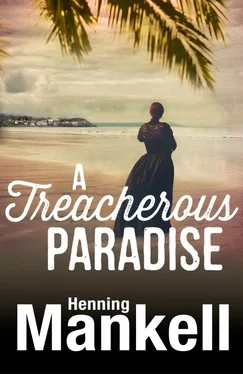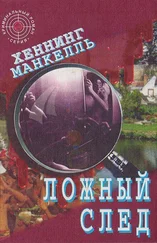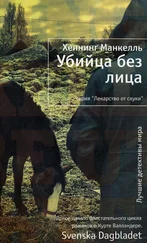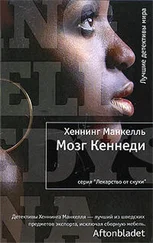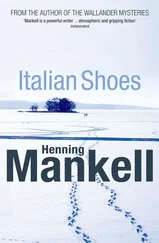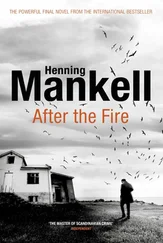It had been Berta’s idea. She was always the one who came out with the boldest and most unexpected suggestions.
‘We must have a photograph,’ she had said. ‘Before you go away. I’m frightened of forgetting what you look like. Frightened of forgetting what we both look like together.’
Hanna started worrying immediately. She had never been to a photographer before, didn’t know what to do. But Berta dismissed all her objections. Besides, both she and Hanna had received a little gift from Forsman, like all the others who worked for him. Forsman’s business had just celebrated its twenty-fifth birthday, and he wanted to mark the occasion by being generous to his employees. The money would pay for the photograph.
They managed to arrange for a couple of hours off one day in the spring when the days were getting longer. Dunn, the photographer, had a studio on the main square. They had put on their best clothes, polished their shoes, and been placed by a table with a chair. Behind them was a white plaster statue of a dragon-slayer with a raised sword. The photographer, who was Danish and spoke a variation of Swedish that was difficult to understand, instructed Berta to sit down on the chair, with Hanna standing behind her, next to her shoulder. To balance the photograph and give it artistic form, he placed a vase of paper flowers on the table.
It was the flowers in Zé’s hand when he bowed in front of Deolinda, so similar to the ones in the photograph, that had jogged Hanna’s memory.
She lay on the bed and looked at the picture. They had received two copies, and kept one each. Berta was smiling at the camera, while Hanna looked more serious. She tried to imagine what Berta would have done if she had been the one lying here in bed on the upper floor of an African brothel, disguised as a hotel. But the photograph provided no answer, Berta said nothing.
She laid the photograph on her naked chest, which had started to dry now. I never expected anything like this, she thought. When Elin stood in front of me and said that I must travel to the coast in order to earn a living, I was totally incapable of imagining what would happen. Perhaps what Hanna was thinking now was confirmation of the fact that she had grown up and was an adult now? Perhaps the big secret was the realization that you never knew what was in store for you? If you made the break and left behind everything that was known and familiar?
Elin can’t see me now, she thought. Berta can’t see me, nor can my brother and sisters. I live in a world that we only share in the sense that it’s incomprehensible, not only for them but also for me, and I’m living in the middle of it.
She unbolted the door and fell asleep. Soon Laurinda would come up with her evening meal on a tray — they had agreed that whenever Hanna didn’t turn up at the separate table allocated to her by Senhor Vaz, Laurinda would take a tray up to her room. That evening the main course was oily deep-fried fish, something Hanna had somehow managed to get down her on a previous occasion. She tried again, but soon pushed the plate aside and ate the dessert, which was half a coconut with slices of pineapple.
When Laurinda came back to collect the tray, Hanna tried to get her to stay by talking to her. Every time she saw Laurinda she had a bad conscience on account of that slap she had given her some time ago. She thought she could go some way towards making up for that by being friendly and talking to Laurinda. After a lot of patience-testing attempts she had finally managed to make Laurinda reply to her questions with more than monosyllables. Sometimes she could even persuade her to tell brief little tales.
But she had never been able to persuade Laurinda to sit down. She always remained standing, she evidently couldn’t even dream of sitting down in the presence of a white woman.
When she first arrived at O Paraiso Hanna had noticed a little tattoo that Laurinda had on her neck, next to her collarbone. A lot of the sailors on the Lovisa had tattoos. Her husband, Lundmark, had an anchor with a red rose tattooed on his left upper arm. But Hanna had never seen anybody with a tattoo next to their collarbone before, nor had she ever been able to imagine a woman with tattoos.
She hadn’t been able to work out what the tattoo represented. Was it a dog, perhaps?
Now she couldn’t wait any longer. She signalled to Laurinda that she should leave the tray on the table and pointed at the tattoo which was visible above her blouse.
‘What is it?’ she asked.
‘It’s a suckling hyena,’ said Laurinda.
When she gathered that Hanna didn’t know what kind of an animal a hyena was, and possibly didn’t even know it was an animal at all, she walked over to a picture that was hanging on the wall. During the days when Hanna hadn’t been able to leave her bed she had lain there and gazed at the painting that depicted in Romantic style a number of different animals that lived in the African savannah.
Laurinda pointed at one of the animals.
‘That’s a hyena,’ she said. ‘It laughed the night I was born. My father heard the hyena out there in the darkness, and afterwards told my mother that it had bidden me welcome and provided me with my first food via its laughter.’
Then she recounted in detail what had happened the night she was born, without hesitation and as if she had merely been waiting for the right opportunity. Hanna didn’t understand some things, and several times Laurinda had to repeat bits and gesture with her hands or make various noises to make her story clear.
She also imitated the hyena’s cry, a laughing sound.
‘I was my mother and father’s first child,’ said Laurinda. ‘But before my uncle died he told me that I was born in the year when there were so many crocodiles in the river that they began to attack and eat one another. It was also the year when the flamingos lost their pink colouring and became pure white. It was a year when lots of strange things happened. My parents lived on the bank of a tributary to the great River Zambezi, in a village where everybody had their own little plantation, their own hut, their own goats, and a smile for everybody they came across during the course of the day. I grew up in a world that I thought could never change. But one day when I was big enough to start helping my mother out in the fields and already had three younger brothers and sisters, a number of white men turned up in the village. They had long beards, their clothes were stained with sweat, they seemed to hate the heat of the sun and they were in a great hurry. They carried guns, and they showed the village chief some papers covered in lots of words. A few weeks later we were driven out of our village by soldiers commanded by the white men. Our little fields were going to be joined together to make a big cotton plantation. Anybody who wanted to stay and work in the cotton fields would be allowed to do so. Everybody else was driven away. My father, whose name was Papadjana, was a man who rarely allowed himself to be bullied and was never downcast when faced with difficulties. These white men with their cotton plantation were a big difficulty, but he had no intention of allowing them to tell him what to do. He spoke to them and said he had no intention of staying and picking cotton, nor of going away. No matter what it said in those papers and irrespective of how many soldiers there were, he was going to stay where he was. He had used a very loud voice when he spoke to the white men, and all the villagers who were standing around began to pluck up courage and give vent to their pent-up feelings when they realized that one of their number wasn’t afraid. I don’t know what happened next, but some more soldiers arrived and one morning soon after, my mother came with tears rolling down her cheeks and said that my father had been found floating in the river, dead, cut to pieces with knives. It was just as dawn was breaking. She stood there, leaning over me as I lay on the woven mat in the darkness of our hut. She told me I would have to go to the big city. I couldn’t stay in the village. She would take the smaller children with her to where her parents lived further inland, but I should make my way to the coast and the big city. I didn’t want to, but she forced me to.’
Читать дальше
